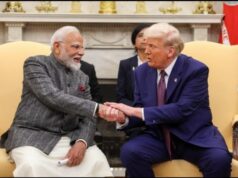NEW DELHI: An excerpt from ‘Talking Point‘, with Professor Rajan Menon(RM), Director of the Grand Strategy Programme at Defense Priorities, Spitzer Professor of International Relations Emeritus, City College New York, Senior Research Fellow at the Saltzman Institute of War and Peace Studies at Columbia University, Co-author of ‘Ukraine in Conflict: The Unwinding of the Post–Cold War Order’ and Richard Rossow(RR), Senior Fellow and Wadhwani Chair in U.S.-India Policy Studies at the Centre for Strategic and International Studies in conversation with StratNews Global Associate Editor Amitabh P. Revi(APR).
Watch the full conversation here: https://www.youtube.com/watch?v=TzAUGiQG300&t=52s
TRANSCRIPT
RM: On the sanctions. They have been severe. There are shortages. The ruble has tumbled. There are foreign currency restrictions on money that can leave the country. Prices have increased. But so far, there is no sign that although the average Russian has been hurt significantly and the Russians cannot prop up the Rouble, because about 50% of the Russian Central Bank’s reserves in dollars are outside the country and blocked, there’s no sense that despite some sporadic demonstrations that the government has come up against there’s a protest movement that it cannot block yet. It has substantial coercive powers at its disposal that I’ve no doubt it will use if need be. I don’t see any sign that Putin, despite the sanctions, is looking for a way out of this.
APR: What are the repercussions in Russia, but more so in the U.S. with midterm elections upcoming, with the possibility of the House and Senate majority moving (to the Republicans)?
RR: Well, clearly, I think when you see the Biden administration moving even further, and looking at impacting Russia’s oil and gas sectors, they picked up the signals that across the United States there is generally support for intervening at least, through sanctions, as well as indirect military support in the conflict in Ukraine. It would have been very difficult with midterms coming up for any democratic elected leader trying to retain office and have some level of authority to take steps on energy that is going to increase prices at home for most Americans. So it seems that trying to assist Ukraine in this effort has been building up widespread support. Certainly, the moral reasons behind it are very strong and powerful. A lot of us weren’t quite sure that the Western reaction would be quite as strong and concerted as it has been. So far, you do see and probably to Putin’s surprise, that it has galvanised pushback from a lot of countries that hadn’t seen eye-to-eye in recent years. So, that might have been a bit of a miscalculation on Russia’s side here, but I agree that so far, you’re not really seeing much interest in braking though.
RM: A word quickly on sanctions. We know a lot about the history of sanctions. And to summarise the literature it is as follows: sometimes they work and sometimes they don’t. But when a country has priced in some of the consequences and is determined to pursue an action that for whatever reason it deems extremely important, it will undergo substantial pain. So, the idea that states are just economic calculators like accountants with green eyeshades misses the point they fight or operate for- all kinds of other reasons-security, prestige, status, and so on. So, the record of sanctions working here is mixed. The problem is that even if they work, it will not save Ukraine from what is now becoming a scaled up highly punitive war. 2 million refugees who have left the country, 800,000 displaced and about $900 million in assets destroyed so far. It will take Ukraine a very long time to come out from this. What I don’t understand is what Mr. Putin’s endgame is here.
APR: If you want to talk about blowback, in terms of how long it can impact the countries imposing these sanctions. $4 a gallon for gas in the U.S.. How long can that price be paid for, especially politically with midterm elections?
RR: Doing it so close, we’re talking just six months ahead of the midterm elections, it does feel like they’ve already taken into consideration the midterm elections, knowing that even if oil prices come down, even if gas prices at the pump come down by then, there’s going to be that reminder that this shock, this intervention really did to some extent contribute to that. Whether the Biden administration decides to reopen some of the areas in the United States that we held off on, on our own exploration and development remains to be seen. But, as we’ve seen in past conflicts, the American public can hold attention for a certain period of time and not too much longer. So, I suspect, we’ve kind of got to calculate the political calculation through to the midterms. But after that, it’s difficult to imagine taking these kinds of steps that would continue to have oil prices at high levels for much beyond that.
RM: Yes, I agree with Richard. But it goes well beyond oil. Ukraine and Russia accounted for about 25% of all wheat exports. Ukraine as a major exporter of corn. Those prices have soared. Container shipping rates and shipping rates for tankers, for fuel tankers have gone up substantially. Those costs will be passed on to the consumer. Metal prices have gone up. This will have an effect on western growth rates. Goldman Sachs downgraded its growth projections for the EU. It’s expected to push inflation up here. I think our inflation rate now is the highest in some decades. And so the question is, as the midterms come around, will the American public say, well, this is all Putin’s fault, or will it at some point, hold the government accountable? The Republicans I’m sure will do everything possible at some point, to say that this is mismanagement by the administration. Will the war end by then? I don’t know.




